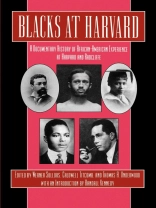The history of blacks at Harvard mirrors, for better or for worse, the history of blacks in the United States. Harvard, too, has been indelibly scarred by slavery, exclusion, segregation, and other forms of racist oppression. At the same time, the nation’s oldest university has also, at various times, stimulated, supported, or allowed itself to be influenced by the various reform movements that have dramatically changed the nature of race relations across the nation. The story of blacks at Harvard is thus inspiring but painful, instructive but ambiguous—a paradoxical episode in the most vexing controversy of American life: the 'race question.’
The first and only book on its subject, Blacks at Harvard is distinguished by the rich variety of its sources. Included in this documentary history are scholarly overviews, poems, short stories, speeches, well-known memoirs by the famous, previously unpublished memoirs by the lesser known, newspaper accounts, letters, official papers of the university, and transcripts of debates. Among Harvard’s black alumni and alumnae are such illustrious figures as W.E.B. Du Bois, Monroe Trotter, and Alain Locke; Countee Cullen and Sterling Brown both received graduate degrees. The editors have collected here writings as diverse as those of Booker T. Washington, William Hastie, Malcolm X, and Muriel Snowden to convey the complex ways in which Harvard has affected the thinking of African Americans and the ways, in turn, in which African Americans have influenced the traditions of Harvard and Radcliffe.
Notable among the contributors are significant figures in African American letters: Phyllis Wheatley, William Melvin Kelley, Marita Bonner, James Alan Mc Pherson and Andrea Lee. Equally prominent in the book are some of the nation’s leading historians: Carter Woodson, Rayford Logan, John Hope Franklin, and Nathan I. Huggins. A vital sourcebook, Blacks at Harvard is certain to nourish scholarly inquiry into the social and intellectual history of African Americans at elite national institutions and serves as a telling metaphor of this nation’s past.
O autorze
Randall Kennedy is Michael R. Klein Professor of law at Harvard Law School. He is author of several books and scholarly articles, including For Discrimination: Race, Affirmative Action, and the Law (Vintage Books, 2013); The Persistence of the Color Line: Racial Politics and the Obama Presidency (Vintage Books, 2011); and Race, Crime, and the Law (Vintage Books, 1998), which won the 1998 Robert F. Kennedy Book Award.












